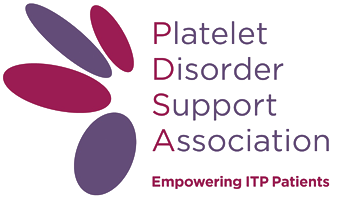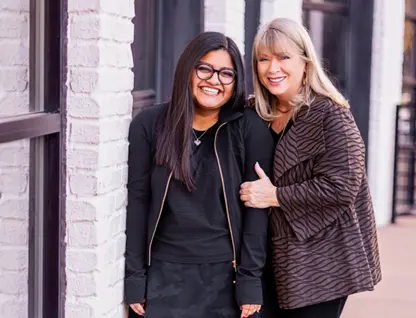Dallas, TX
A Mom and Daughter's Journey of Learning and Advocacy for ITP
- What is your name?
Ria and Elly - Where are you from?
Dallas, TX - How are you connected to ITP?
Ria: I was diagnosed with ITP during my sophomore year of high school (2019).
Elly: I’m Ria’s mom. - How/Why did you get involved with PDSA? Why do you choose to stay involved?
Elly: When Ria was first diagnosed, I spent countless hours searching for answers and trying to understand ITP. That’s when I found PDSA, and it quickly became an invaluable part of our journey. While Ria’s medical team is amazing, so much of what we’ve learned about ITP has come from PDSA. It has been our trusted guide, connecting us to crucial resources and a community that truly understands ITP and what we’re going through. Whenever we have questions, we turn to the PDSA website or the Facebook group, where we often find others that have faced similar challenges. For example, when Ria started experiencing extreme fatigue, we found that it was something many others with ITP had also dealt with, long before it became widely acknowledged by doctors. Learning about side effects, like the toll of steroids or the severe headaches after IVIG, has helped us feel more prepared.
We’ve been fortunate to attend several PDSA conferences, including the virtual ones in 2020 and 2021, as well as the in-person events in Seattle, Chicago, and San Antonio. In San Antonio, we were honored to serve as ambassadors, and Ria even had the opportunity to speak on a panel about her experiences with medical experts. We also regularly participate in quarterly PDSA teleconferences with Texas-based patients. We had the opportunity to participate in virtual Capitol Hill sessions in June and October, where we met with our Texas Senators and members of the Texas House of Representatives to advocate for funding for ITP and the ITP community. We’re eagerly looking forward to continuing this advocacy during this year’s in-person meetings.
Staying involved with PDSA has given us a sense of community, connection, and support. It truly does take a village to navigate a rare disease like ITP. Thanks to PDSA, we stay up to date on the latest ITP research and treatments, and we are grateful for the friendships we’ve formed with others on the same or similar journey.
Ria: I choose to stay involved because attending the PDSA conference in person made me feel truly connected. Meeting people in group sessions, hearing their stories, and being surrounded by others who understand what it’s like to live with ITP made me feel seen. It wasn’t just about learning—it was about becoming part of something bigger.
When you’re dealing with a rare disorder like ITP, it can feel incredibly isolating. Finding a community that shares similar struggles showed me that I wasn’t alone. That sense of connection and support is what keeps me involved and passionate about raising awareness. PDSA has given me so much—knowledge, support, and a sense of belonging—and I feel a strong responsibility to give back. I want to make the journey easier for those who are newly diagnosed, just like others did for me. If I can help even one person feel a little less lost, then it’s all worth it. - What is your favorite part about volunteering for PDSA and spreading ITP Awareness?
Our favorite part about volunteering for PDSA and raising awareness about ITP is the deep sense of connection we feel with others. It's a way for us to give back the support we've received along Ria's journey. PDSA has truly been our lifeline, providing not only valuable knowledge but also a sense of community and the gift of incredible friendships. Volunteering allows us to help others who are just beginning their journey, to offer hope, guidance, and a sense of belonging. It's about supporting others on this journey, lighting the path for others just beginning this journey, building lasting bonds, while making a real impact. - How has PDSA impacted your healthy journey?
Elly: The support we've received from PDSA and the PDSA community has truly transformed our journey! The medical specialists we've connected with through PDSA have been incredible, always keeping us informed with the latest research and treatments. What really stands out is the access we’ve had to such knowledgeable experts who are at the forefront of ITP research. During COVID, for example, an international team of ITP specialists from countries like France, China, and Germany came together for a virtual conference to discuss how COVID, ITP, and vaccines might interact and answer our questions. Their real-time research gave us the information we needed to make the decision for Ria to get vaccinated and even contribute her data to the study. At PDSA conferences, we’ve attended sessions on a range of topics, like women’s health. We've had reassuring conversations with specialists who explained that women with ITP can safely give birth, as long as certain precautions are taken. We've also learned about the latest treatments, talked to pharmaceutical representatives, and discussed everything from mental health to holistic health. Overall, PDSA has empowered us with knowledge and confidence, and that’s made all the difference in our journey.
Ria: PDSA has truly been a game-changer for me. It’s not just a resource—it became my lifeline. When I was overwhelmed by treatment decisions and the physical and emotional challenges of ITP, PDSA gave me the knowledge and support I couldn’t find anywhere else. I was able to take the information I learned from their conferences and bring it to my hematologists, sparking crucial discussions about my treatment, particularly around symptoms like fatigue and brain fog. More than anything, PDSA helped me shift from feeling like just a patient to becoming an advocate for my own health. Even on the hardest days, knowing that I have an entire community backing me up gives me the strength to keep going. - What do you do for school/work?
Ria: I’m a junior at college in pre-nursing.
Elly: I work in IT Marketing.

